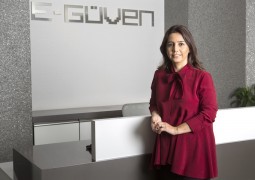Networked Society at 2021 and Ericsson
by 0

‘28 billion machines will be connected by 2021‘
Turkcell Technology Summit 2016 hosted a keynote speaker Aniruddho Basu from Ericsson – VP, Head of Technology Advisor & Portfolio Group Function Technology. In his presentation, he shared his vision on how technology will change the world’s future and the dynamics of the paradigm change. After his presentation, we had an interview with him.
In his presentation, he mentioned by 2020;
- 28 billion machines will be connected with 9.1 billion mobile subscriptions. Videos will be the largest data by then and 70% of the data will be videos, which means eleven times more than today.
- Mobile phones are also used to upload and consume data. The studies showed the growth of mobile broadband has a positive correlation with employment, education and GDP growth in any country. Investment in fiber infrastructure which is a part of mobile broadband drives the economy.
- In 2020, the data of data that is used will be much higher.The digital universe size in the year 2021 will be 44 zeta bytes (21 zeros followed by 44). When three zeros are dropped from this number, it will give the amount of data size that will be generated each month in 2021.
- Media will be the new game changer in networks. Every industry will begin to put pressure on networks and this is the new challenge.
- Even today software is the new way of doing things and App economy which is all software is pretty large. Today Apple is making 20 billion $ a year out of apps and Android is making 40 billion $ but App economy generates 300 billion $ economy out of apps.
- If the hardware is not capable, apps will not work properly. So they will change also. More open sourced solutions will come out. For ex. Facebook published an open source blueprint, so everybody can build a data center. That will enable external developers to be able to generate new values.
- Security will be quite critical when all devices will be connected.
- The world will be built around how we work with data. New assets and new logics cause a paradigm change.
- User behavior is changing. People begin to buy cars that have more connectivity options which have never happened before.
- Carbon dioxide that the industry is producing will decrease.
You can watch the speech from the link;
http://www.turkcell.com.tr/tr/hakkimizda/video-galeri/turkcell-teknoloji-zirvesi-2016/ilker-kuruoz-aniruddho-basu—4-5g-farki-dunyada-ve-turkiyede-hiz-ve-otesi
Here is our nice interview with Aniruddho Basu.
In your presentation, you said 5G will change our world dramatically. Please tell us how?
Let me define 5G as a terminology. When we go from 2G, 3G, 4G , 4.5G to 5G standards are typically decided by ITU (International Telegraph Union) which is the United Nations specialized agency for information and communication technologies – ICTs. The standards are decided and redefined in its Headquarter in Geneva. So, 5G as a global standard is defined in IMT-2020 (http://www.itu.int/en/ITU-R/study-groups/rsg5/rwp5d/imt-2020/Pages/default.aspx ).
When we talk about mobility, it is Radio Access Network, we talk about GSM, CDMA, LTE (4.5G) and then 5G. The term of 5G will happen in 2020 but it is not something you switch on, like saying ‘Oh here it is 5G!’ The radio access networks today which is dominantly LTE-based will have higher frequency bands. The way it is designed cannot cope with the new requirements. LtenX will be the new form. This is one part. As you saw there is no point having a capable Radio Access Network when rest of the network is not capable enough. If you have a very good coverage in the radio side but your core network is slow, it does not help. For us, the 5G vision is to have a larger system and platform. To get ready to IMT-2020 all the infrastructure shall evolve.
Up on 4G, we decided on standards how the hardware, software, integration should look like. When we opened the networks to the capabilities to app developers, the whole app economy created was on top of the network economy. You can realize why 5G will change things dramatically when you imagine the world where there are app stores for each industry. Imagine that automotive or utility industries will have their own app stores and developers have access to those networks. 5G will allow all networks to be open and accessible. We want to expand the capabilities, programmability and accessibility of networks for anyone who wants to create value on top of that like open interfaces, new methodologies, access to new tools etc.
You call it ‘Transformed Industries’.
Transformation is, unfortunately, a hype word because we are transforming every single day . When you look at the topics that we are talking about today, for example, the driverless cars or virtual reality, we were talking about those for decades. Why did it take so much time?
Yes, we wonder, why? Were people not ready?
Absolutely, that is one point. Actually, the first one is the technology part. The things are happening today because of the connectivity. Mobility has allowed people and things to be connected. Uber would not be working if there was no connectivity. The app economy would not be existing as well.
The second point is the trends that we forecast, predict or hope which comes from the technology dimension which is coming mostly from a bunch of middle-aged white people in Silicon Valley. Who likes Google Glass? In the USA maybe but it does not happen in the rest of the world. It’s like driverless cars. I am from India. We already managed to fit twelve people in a Suzuki car 20 years back. The whole efficiency paradigm was already there. There is nothing new to it. These twelve people started to earn more stuff add they want to buy their own cars. Owning a car is also an aspirational thing in many cultures. So, for the Silicon Valley guys it is cool to have a Google car but for the people in India, the important thing is to buy their first car. This is a fact that will not change dramatically in the near future.
Technology is a good thing but how it is adopted depends on a few things. How easy it is to use? Does it fit to culture? In many instances, the socioeconomic factors and cultural aspect play a role. When Google announced Google Glass, it was a huge thing in California. When you take the same stuff to Europe where people have bigger privacy concerns, Google Glass has never had a success in such an environment. In Europe, people are liable to trust their governments more than private companies but in the USA, it is vice versa. So both have different approaches. How you build technology and how to use it depends on the culture also. New technologies are exciting, for example, a driverless Google car. When you see it in a fair, it excites you but you cannot imagine that it would be available in a couple of years for a decent price for an ordinary person. It still will find its use in some shapes, for example, the materials they use or the technology of the engine can be industrialized and commercially used. They may not be completely the Sci-Fi but they will have a positive effect on people’s lives. For example the drones. Can you imagine the nightmare of regulating drones, flight space, and liability issues?
You can even murder a person with a drone.
Exactly! But the good part is to have such technologies in the agenda, they drive the capabilities of the planet which will eventually find a commercial use.
You mentioned we will all be integrated. Please tell us how deep?
We built an ecosystem when it came to mobility. We have app developers, device manufacturers, operators and infrastructure providers. There is another ecosystem like car manufacturers also which have their own ecosystem, standards, suppliers and technology providers. Our vision is to create one unique ecosystem and a technical platform that will allow all those different ecosystems to collaborate. The reason having a positive effect on GDP growth with seven billion people is that mobility has worked across borders, countries and devices. That scale caused the mobility cost to go down. People in Africa have smartphones. If each ecosystem decides to create their own network, mobilizing and digitalizing will be very expensive. Our mission is to get the capabilities in a network and while extending it, to work with those sectors people and make them collaborate. When they adapt those technologies, we will come to a very large scale that has never been done before. The scale we have gone for 7 billion mobile subscriptions can go to 50 or 500 billion devices in the near future and it is a huge economy. This is basically our strategy.
You mentioned a saying from Niels Bohr ‘Predictions is difficult, especially about the future.’ Even though you have some. What are your predictions for the future?
Correct, I have two predictions. First is that all clouds will be connected to all devices; across consumers, industries and enterprises for any application. Secondly is about networked society. We will have a society powered by intelligent networks and devices that have IQ’s.
Thank you very much.
My pleasure.





